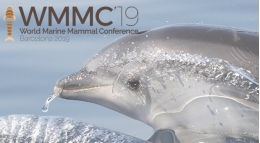Barcelona gathers around 2,000 international experts in the 1st World Marine Mammal Conference
About 32 % of marine mammals worldwide are listed as vulnerable species, endangered species or in danger of extinction, according to the International Union for Conservation of Nature (IUCN). In the Mediterranean, the populations of Mediterranean monk seal (Monachus monachus) have practically disappeared, and the common bottlenose dolphin population (Tursiops truncatus) has reduced by 30 %. In other parts of the planet, some porpoise species –such as the Vaquita or Phocoena sinus- are in highly danger of extinction, and the polar bear population (Ursus maritimus), is expected to decline by 30 % by 2050.
Tackling global threats for the conservation of marine mammals, promoting international collaboration and improving conservation strategies of populations in regression are some of the goals in the 1st World Marine Mammal Conference – WMMC 2019, to be held from 9 to 12 December in Barcelona, under the organization of the University of Barcelona and the entity Submon. This international event, which opened its registration period for participants, is promoted by the Society for Marine Mammology (SMM) and the European Cetacean Society (ECS), supported by the Biodiversity Foundation of the Ministry for the Ecological Transition.
Together for science and conservation of marine mammals
With the motto “Together for science and conservation”, the conference will gather around 2,000 international scientists to the Barcelona International Convention Center (CCIB), which will become a debating place for scientists, conservationists, managers, educators, students and professionals in the field of conservation and protection of marine mammals worldwide.
The program includes more than six hundred oral presentations and a thousand scientific banners to cover the current researches on fields such as conservation of marine mammals, polar ecology, toxicology, new technologies or interactions between marine fauna and fishing activities.
The current challenges in the international research on marine mammals, effects of climate change or the role of science in the management and conservation of biodiversity will also be the core of many presentations. Also, the program includes a series of technical workshops –prior the conference- to promote the training of future generations of experts and the collaboration between different sectors related to the conservation of marine mammals.
This forum, in addition, will be regarded as a media platform “to allow the media send its message to the world, in an atmosphere of a high scientific outreach that will gather experts on marine sciences and won’t probably take place again in a long time”, say the co-presidents of the organizing committee of the conference, the lecturer Manel Gazo, from the Research Group on Large Marine Vertebrates from the Faculty of Biology and the Biodiversity Research Institute (IRBio) of the UB, and the expert Carla Chicote from the entity Submon.
Submon is an entity aiming to preserve, study and inform about the marine environment. Its main objective is to preserve marine biodiversity to reach a sustainable use of the marine environment, apart from promoting a change in society regarding the sea by transmitting knowledge and through direct actions on the environment.
The Society of Marine Mammology (SMM) aims to promote the worldwide progress on science on marine mammals and to contribute to its relevance and impact in education, conservation and management. The SMM holds biennial conferences and this year joins the European Cetacean Society as hosts of the World Marine Mammal Conference.
The European Cetacean Society (ECS) was created in January 1987 and aims to promote scientific and conservation studies on marine mammals, apart from gathering and sharing scientific data for the members of ECS and the general public. This entity, coordinated by a council formed by eleven members from different countries, organizes an annual conference in Europe.
Images: Manel Gazo, University of Barcelona
Source: ComunicacióUB
